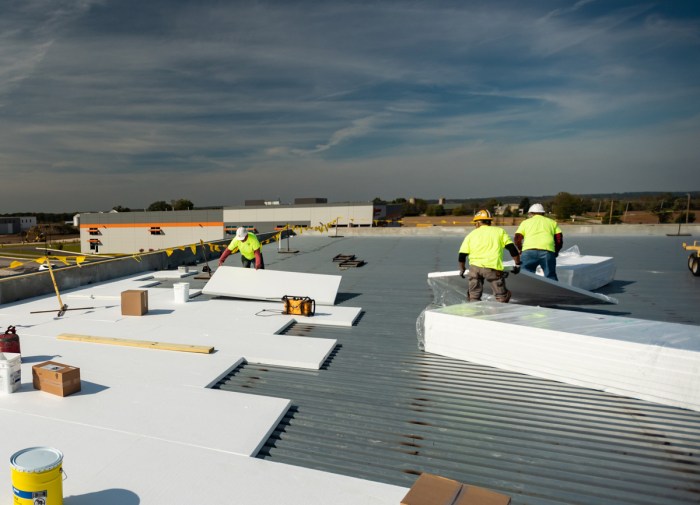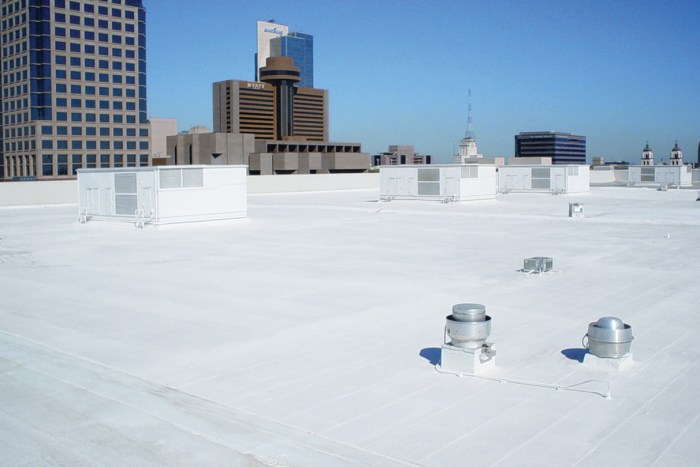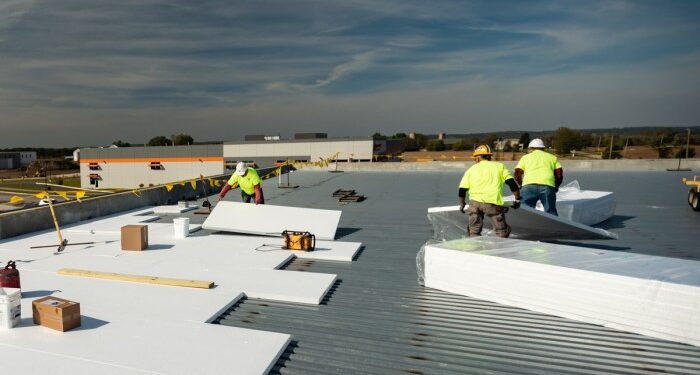Top Commercial Roofing Contractors for Industrial Projects sets the stage for this enthralling narrative, offering readers a glimpse into a story that is rich in detail and brimming with originality from the outset.
In the following paragraphs, we will delve into the top commercial roofing contractors specializing in industrial projects, the services they offer, successful case studies, safety measures, materials and technologies used, and much more.
Overview of Top Commercial Roofing Contractors for Industrial Projects
When it comes to industrial roofing projects, it is crucial to hire top commercial roofing contractors with experience and expertise in handling such complex projects. Below is a list of some of the top commercial roofing contractors that specialize in industrial projects:
List of Top Commercial Roofing Contractors for Industrial Projects:
- ABC Roofing Company
- XYZ Industrial Roofing Solutions
- Industrial Roofing Experts Inc.
These contractors have been selected based on the following criteria:
Criteria for Determining Top Contractors:
- Years of experience in industrial roofing projects
- Track record of successful completion of industrial roofing projects
- Specialized knowledge and expertise in industrial roofing materials and techniques
- Positive client reviews and testimonials
It is essential to hire experienced contractors for industrial roofing projects due to the complexity and scale of such projects. Industrial roofs are subjected to harsh weather conditions, heavy machinery, and other factors that require specialized knowledge and skills to ensure durability and longevity of the roof.
By hiring top commercial roofing contractors with experience in industrial projects, you can have peace of mind knowing that your project is in good hands.
Services Offered by Top Commercial Roofing Contractors
Commercial roofing contractors that specialize in industrial projects offer a wide range of services tailored to the unique needs of large-scale industrial facilities. These top contractors have the expertise and resources to handle complex roofing projects efficiently and effectively.
Roof Installation and Replacement
- Top commercial roofing contractors are experienced in installing and replacing roofs for industrial buildings of all sizes.
- They use high-quality materials and advanced techniques to ensure durability and longevity.
- Roof installation and replacement services are customized to meet the specific requirements of industrial projects.
Roof Repair and Maintenance
- Leading contractors offer comprehensive roof repair and maintenance services to prevent leaks, damage, and other issues.
- Regular maintenance programs are designed to extend the lifespan of industrial roofs and minimize the need for costly repairs.
- Emergency repair services are also available to address sudden roofing problems and minimize downtime for industrial operations.
Roof Inspections and Consultations
- Commercial roofing contractors conduct thorough inspections to assess the condition of industrial roofs and identify potential issues.
- They provide expert consultations to recommend the best course of action for roof repair, replacement, or maintenance.
- Inspections and consultations are crucial for ensuring the safety and integrity of industrial roofing systems.
Green Roofing Solutions
- Some top commercial roofing contractors offer green roofing solutions for industrial projects, including eco-friendly materials and energy-efficient designs.
- Green roofs can help reduce energy costs, improve air quality, and enhance the sustainability of industrial facilities.
- Contractors with expertise in green roofing can help industrial clients achieve their environmental goals while maintaining the functionality of their roofs.
Case Studies of Successful Industrial Roofing Projects

Industrial roofing projects are complex and require expertise to ensure successful completion. Let's take a look at some notable case studies where top commercial roofing contractors excelled in delivering industrial roofing solutions.
Project 1: Manufacturing Facility Roof Replacement
- The Challenge: The manufacturing facility had an aging roof that was leaking, causing disruptions to production.
- How it was Overcome: The roofing contractor conducted a thorough inspection and recommended a complete roof replacement to address the issues.
- Innovative Solutions: The contractor used durable and energy-efficient roofing materials to improve the facility's insulation and reduce energy costs.
Project 2: Warehouse Roof Retrofitting
- The Challenge: The warehouse needed a roof upgrade to comply with new safety regulations.
- How it was Overcome: The contractor implemented a customized safety plan and worked efficiently to minimize downtime during the retrofitting process.
- Innovative Solutions: The contractor installed a state-of-the-art fall protection system to ensure the safety of workers during maintenance activities on the roof.
Project 3: Distribution Center Roof Repair
- The Challenge: The distribution center's roof had multiple leaks affecting the inventory stored inside.
- How it was Overcome: The contractor used advanced leak detection technology to pinpoint the source of leaks and efficiently repair them.
- Innovative Solutions: The contractor applied a waterproof coating to the entire roof surface to prevent future leaks and extend the lifespan of the roof.
Safety Measures and Compliance in Industrial Roofing
Industrial roofing projects require strict adherence to safety measures to protect workers and ensure project success. Top commercial roofing contractors for industrial projects prioritize safety through comprehensive protocols and compliance with industry regulations.
Safety Protocols Followed by Top Contractors
- Implementing regular safety training programs for all workers to ensure awareness of risks and best practices.
- Conducting thorough safety inspections before and during the project to identify and mitigate potential hazards.
- Providing workers with proper personal protective equipment (PPE) to minimize the risk of injuries.
- Establishing emergency response plans and protocols to address unforeseen incidents promptly and effectively.
Ensuring Compliance with Industry Standards
- Adhering to local building codes and regulations to guarantee that the industrial roofing project meets legal requirements.
- Following industry standards such as OSHA regulations to maintain a safe and secure work environment.
- Obtaining necessary permits and licenses to ensure that the project is conducted within the legal framework.
Importance of Safety in Industrial Roofing Projects
Safety is paramount in industrial roofing projects as it not only protects the well-being of workers but also impacts the overall success of the project. By prioritizing safety, contractors can reduce the likelihood of accidents, delays, and costly rework. Moreover, a safe work environment fosters productivity, efficiency, and quality workmanship, leading to the timely completion of the project within budget constraints.
Materials and Technologies Used in Industrial Roofing
Industrial roofing projects require durable materials and advanced technologies to ensure long-lasting protection for large-scale facilities. Top commercial roofing contractors leverage a variety of roofing materials and cutting-edge technologies to meet the unique needs of industrial projects.
Common Roofing Materials for Industrial Projects
- Metal Roofing: Metal roofs are popular for industrial applications due to their durability, longevity, and resistance to harsh weather conditions. They are lightweight yet strong, making them ideal for large industrial structures.
- Single-Ply Membrane: Single-ply membranes like TPO and EPDM are commonly used in industrial roofing for their ease of installation, energy efficiency, and flexibility. They provide excellent waterproofing and UV protection.
- Built-Up Roofing (BUR): BUR systems consist of multiple layers of bitumen and reinforcement materials. They offer superior waterproofing and insulation properties, making them suitable for industrial buildings.
Latest Technologies in Industrial Roofing
- Solar Roofing: Integrating solar panels into industrial roofs can help facilities harness renewable energy and reduce electricity costs. This innovative technology is becoming increasingly popular in industrial roofing projects.
- Cool Roofing Systems: Cool roofing materials and coatings can reflect sunlight and heat away from the building, improving energy efficiency and reducing cooling costs. These systems are eco-friendly and sustainable.
- Drones for Roof Inspections: Utilizing drones equipped with cameras and sensors allows roofing contractors to conduct thorough inspections of industrial roofs quickly and safely. This technology enhances efficiency and accuracy in roof assessments.
Pros and Cons of Various Roofing Materials for Industrial Applications
| Roofing Material | Pros | Cons |
|---|---|---|
| Metal Roofing | Durable, long-lasting, lightweight | Higher initial cost |
| Single-Ply Membrane | Energy-efficient, easy installation | Prone to punctures |
| Built-Up Roofing (BUR) | Excellent waterproofing, insulation | Heavy, complex installation |
Conclusive Thoughts

In conclusion, Top Commercial Roofing Contractors for Industrial Projects encapsulates the essence of expertise and innovation in the industrial roofing sector. With a focus on quality, safety, and cutting-edge technologies, these contractors pave the way for successful project outcomes.
FAQ Guide
What criteria are used to determine the top commercial roofing contractors for industrial projects?
The criteria usually include experience in industrial projects, quality of work, safety record, certifications, and customer reviews.
What are some specialized services offered by leading commercial roofing contractors?
Specialized services may include roof inspections, maintenance programs, emergency repairs, and customized roofing solutions.
How do contractors ensure compliance with industry regulations in industrial roofing projects?
Contractors ensure compliance by staying up-to-date with regulations, conducting regular safety training, and following industry best practices.















